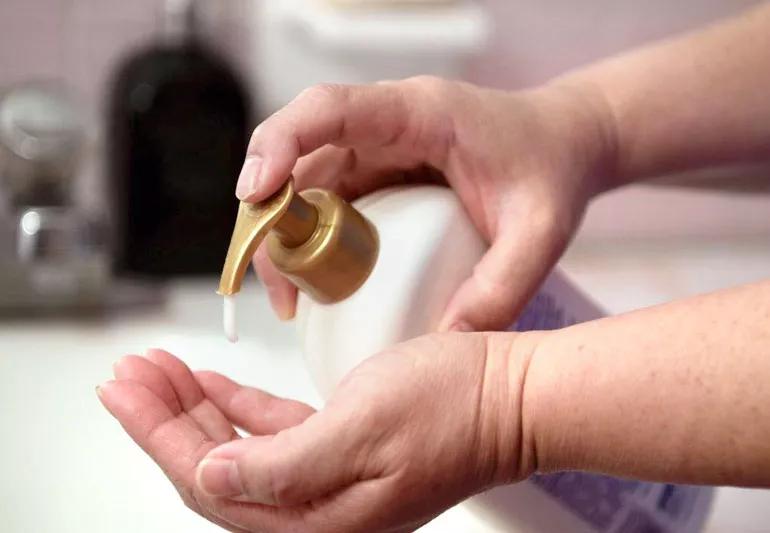Try turning the heat down on the water and opting for a moisturizing soap

Image content: This image is available to view online.
View image online (https://assets.clevelandclinic.org/transform/23cac4a5-3098-4c7a-8036-24fa8e454b38/dryHandsWashing-CMAP-ios-41320-770x533-1_jpg)
applying lotion after washing hands
One of the best ways to protect yourself from diseases of all kinds is to wash your hands — a lot. But all that scrubbing can make the skin on your hands dry, cracked and sore.
Advertisement
Cleveland Clinic is a non-profit academic medical center. Advertising on our site helps support our mission. We do not endorse non-Cleveland Clinic products or services. Policy
Dermatologist Melissa Piliang, MD, breaks down why your hands might get dry, what happens when you wash them and what you can do to keep your hands soft and healthy.
If you feel your hands getting irritated after washing, you’re not alone.Dry hands after washing can be a common issue, and it’s usually caused by the removal of natural oils and moisture from your skin during the washing process.
Here are some factors that contribute to dry hands after washing:
Advertisement
You may have heard that opting for hand sanitizer may be a less irritating way to keep your hands clean. But that’s not exactly the case. While using hand sanitizer doesn’t involve hot water or soap, it’s not a proper swap-out for handwashing. Plus, hand sanitizer can also cause irritation on your skin.
To minimize the potential drawbacks of hand sanitizer and protect your skin:
If you struggle with dry skin, it can be frustrating every time you go to the sink to wash your hands. But there are ways to avoid irritated skin and find relief from dryness.
Remember: Washing your hands consistently and thoroughly protects you against germs and bacteria, so here are a couple ways to make it less of a hassle:
You don’t have to switch to completely cold water, but scalding hot water during a handwash isn’t doing you any favors either. Try to turn down the temperature while washing your hands and even showering to avoid your hands feeling dry or irritated. “Hot water can wash away healthy skin oils,” Dr Piliang reiterates.
Remember to do this when you’re doing other hygiene-related chores like washing the dishes. Lukewarm as opposed to hot water can be just the difference your skin needs to avoid dryness.
Certain soaps have a moisturizing agent in them that can be gentler on your skin and prevent dryness. “Your best bet is to use a moisturizing soap and rinse well afterwards,” Dr. Piliang advises.
When shopping around for gentle soap, try looking for moisturizing ingredients like:
Using a moisturizer after washing is one of the best ways to keep your hands feeling smooth and nourished. “After washing, apply a lotion to help seal in the moisture,” Dr. Piliang recommends. Opt for a lotion or hand cream that’s fragrance-free to avoid any further irritation on your skin.
If you’re prone to very dry skin, you can skip the lotion and go straight to a good, thick moisturizer. You want to look for a cream, balm or ointment — something that’s thick and a little bit hard to spread that will provide more moisture to your skin.
You can also avoid dry hands after washing by the way you dry them. Your first instinct after washing is probably to dry your hands until not even a drop of water is left. But it’s actually better to leave your hands a bit damp after drying. If you can get away with air drying your hands sometimes, even better! Also, don’t rub, just dab, so you’re not irritating your skin.
Advertisement
Finally, make sure you’re avoiding any unnecessary interactions with your hands. “Especially if you have really dry hands, it’s wise to consider wearing gloves when you do dishes or cleaning,” suggests Dr. Piliang.
“Also, running a humidifier in the bedroom at night can help moisten the air and your skin while you sleep,” she adds. This way, you’re keeping your hands healthy throughout the day, so that hopefully, they’re less sensitive to handwashing.
Washing your hands is an important way to stay healthy. Consistent handwashing can help kill bacteria and prevent spreadable diseases. But if you’re frustrated with your hands getting dry after each wash, try turning down the temperature, swapping out your soap and consistently reaching for a good moisturizer.
If you feel like you’re experiencing extreme dryness after handwashing that’s leading to cracking or pain, be sure to talk to a dermatologist or healthcare provider.
Advertisement

Delivered every Tuesday!
Sign up for our Health Essentials emails for expert guidance on nutrition, fitness, sleep, skin care and more
It's a letter about the news!
Learn more about our editorial process.
Advertisement
Technique matters — and research suggests most of us still aren’t doing it right
Ordinary soap and water or an alcohol-based sanitizer can do the job
Find out the right way to use it — and which ones aren’t safe
Pantothenol is a powerful moisturizer and can help repair damaged skin and hair
This olive oil-based soap is generally mild and safe when diluted
Eczema triggers are different for everyone, but there are some common ways to manage and prevent flare-ups
Choose cream for your body and lotion for your face, and skip the fragrances and botanicals
Untreated, some infections can be contagious for up to four weeks!
Type 2 diabetes isn’t inevitable with these dietary changes
Applying a hot or cold compress can help with pain
Pump up your iron intake with foods like tuna, tofu and turkey